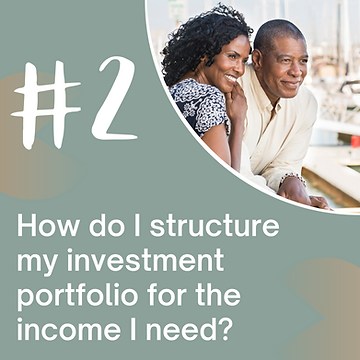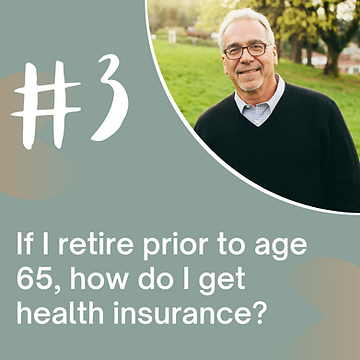
By: Jeff Bernier, CFP®, ChFC, CFS and Mona Fahmy, MBA, CFS, AIF®

#1 Can I retire? When can I retire?
This is the ultimate retirement planning question. And, like most things in life, it depends. As no two fingerprints are the same, no two sets of financial resources and goals are the same. We all have our own unique vision of what the ideal retirement looks like. It is important to start with defining what an “ideal” and what an “acceptable” retirement might look like to you.
Ideal: What would it look like many years from now if things worked out well? How much would you spend on living, housing, healthcare, travel, gifts to family, charities, legacies, etc.? What is the earliest you would like to make work optional? What is the least amount of volatility you’d ideally like to accept in your portfolio?
Acceptable: What is the least amount you’d need to live comfortably, smallest legacy, the longest you would see yourself working, the most amount of volatility you think you could handle?
Then assess present and future resources – both financial and non-financial. Your balance sheet, your income, your direct income sources (Social Security or pensions), your human capital (ability to earn), your insurance, potential future inheritance and your ability and tolerance for uncertainty.
Take into account the rising cost of living, future investment returns, tax rates and life expectancies. And a caution – you cannot blindly assume the future will be like the past.
From this, a qualified financial advisor could run an analysis and make a “reasonable” estimate of what retirement might look like. This may include scenarios such as different retirement ages, retirement spending, working part-time, gifting, or portfolio choices, etc. These are personal and custom choices to you. Coaching on tradeoffs is an important value that an advisor can bring.
Once a plan is agreed upon, it should be monitored to determine if you are “on track” – and if not, what adjustments should be considered.

Broadly, there are two ways to build a retirement income portfolio.
- Income-Based: Limit your spending to the “yield” from the portfolio – the income-based approach. You would only consume the income (dividends and interest) that the portfolio generated. At low interest rates and dividend yields, it may not generate enough income to meet your spending needs. Investors in this approach often increase exposure to “higher yielding” investments (reach for yield) to get the income needed to meet expenses which increases the risk of the portfolio. In a low yield environment, some of the highest yielding investments are the most popular, and therefore are relatively expensive and have lower expected total returns. A last point, company dividend policies could change.
- Total Return Approach: I believe a better approach is to build a portfolio based on your need, willingness, and ability to take risks. This approach seeks to build a mix of investments with a total expected return (dividends, interest, and appreciation) to meet your goals and is unconcerned with how income is generated – through yield or selling securities. The yield of the portfolio is simply a byproduct of a broadly diversified portfolio.
Your time horizon is a key factor in building a portfolio. The appropriate strategy to fund a goal that is five years away will certainly differ from a strategy for a goal that is 30 years away.
However, your age may not be the most important factor. What matters more is your need, willingness, and ability to take risks. And remember, if you are the typical married couple, retiring at age 62, there is a high probability that one of you will continue to need income in 30 years!

#3 If I retire prior to age 65, how do I get health insurance?
Many people are hesitant to retire prior to the Medicare eligibility age of 65 for fear of not having the access to affordable healthcare coverage. With proper planning and research, obtaining health insurance is possible and doesn’t have to derail your early retirement plans. It’s important to pick the option that is appropriate for your circumstances.
Here are some of the most common options:
- Spousal insurance – If your spouse is still working, joining his or her employer-sponsored plan is a great option as often the employer will subsidize some of the insurance payment. Be sure to enroll in the spouse’s plan within 30 days of the qualifying event.
- Employer-sponsored retiree benefits – Some employers (albeit not many) do offer insurance plans for retirees. The cost and coverage vary significantly. Some employers will allow retirees to remain on the plans with subsidized premiums, others will expect the retiree to pick up the entire cost of premiums. Depending on the cost and coverage, there may be better options available.
- COBRA – Many employers are required to give employees the option to continue coverage for 18 months upon leaving an organization. However, the full cost is covered by you.
- Health Insurance Marketplace – You may qualify for a special enrollment on the healthcare.gov website. Depending on the qualifying event, you may have 60 days from the event to obtain insurance. The American Rescue Plan has extended subsidies for marketplace plans through 2025. Since eligibility for subsidies is based on income, it’s important to review your situation to see if this is an affordable option.

#4 When should I start taking Social Security benefits?
Social Security timing is an important decision for retirees. The right time to start claiming Social Security depends on many factors in your life and in your financial plan. You can claim Social Security as early as age 62, but that is usually not advisable as this may reduce your benefit by up to 30%. And once you file early, you are permanently locked into the lower benefit. Waiting till at least your Full Retirement Age (FRA) is better under many circumstances. For every year after your FRA till age 70, you will receive an 8% increase in your benefit which may be a substantial increase in your income.
Here are some of the factors to consider:
- Health – If you have poor health or family history that may predispose you to certain illnesses, taking Social Security may make sense. However, if you have a reasonable expectation of longevity, postponing may provide a key source of income.
- Length of Employment – Claiming Social Security prior to FRA is normally not advisable if you are still working. Again, your benefit may be reduced by up to 30% and, in 2022, if your earned income is above $19,560, your Social Security benefits will be reduced by $1 for every $2 earned over the limit. Once you reach FRA, you may still earn any amount of income and still receive your full Social Security benefit. If you are not earning any income and do not have sufficient financial resources, taking Social Security early may be the only feasible option.
- Balance Sheet – Your financial resources and how they are structured may impact the Social Security timing decision. If you have substantial assets that can be used to fund expenses in a tax-efficient matter, delaying Social Security may be feasible even if you retire prior to FRA. If you do not have adequate liquid financial resources or your balance sheet is comprised almost exclusively of tax-deferred accounts, delaying Social Security may not be advisable.
- Marital Status – Your marital status is an important factor. If you are married, reviewing Social Security options in context of spousal benefits is important. Depending on the Social Security benefit amount, it may be beneficial for one spouse to take benefits at FRA and the other to delay till age 70. Analysis should also be run for widowers and divorcees to determine if there are any additional Social Security benefits that may apply.

As with many questions regarding finances and retirement, whether to have a mortgage in retirement depends on your situation. Being debt free in retirement can bring additional “peace of mind” and could be more than just a mathematical decision. It has been my experience that often retirees who are mortgage free can weather unexpected expenses as well as market volatility with more confidence. Without debt, you might be able to have a portfolio with more equity exposure and thus higher expected returns (albeit with additional risk). However, being mortgage free may not be feasible for everyone.
If you are nearing retirement, there are several factors to consider when considering paying off your mortgage or financing a new home purchase.
- Income: How is your income in retirement structured? If you have high pension income and Social Security income, your mortgage payment may easily continue to be covered in retirement. With those income sources, you may also qualify for a mortgage in retirement.
- Balance sheet: Your financial resources and how they are structured may impact your ability and decision regarding a mortgage. If your financial resources are not sufficient to pay down the mortgage or purchase a home without one, then focus on the appropriate mortgage product for your circumstance. If you have substantial financial resources but they are all in tax deferred accounts such as IRAs and 401ks, the tax impact of pulling a large amount out may not make this a prudent option.
- Other considerations are current interest rates and how long will you stay in a house. If you have a low interest rate and can support the monthly payments, keeping the mortgage as is may make sense. A low fixed interest rate mortgage on a home might also be a reasonable inflation “hedge”. In an environment with higher mortgage rates, financing a new home may have a bigger impact on your long-term financial stability. If you are planning on moving in the near term, it may be better to wait on paying off the mortgage till there is clarity on the financial impact of the new home.
As you can see, there are many variables that go into answering these questions and each decision is dependent on your own personal situation. A qualified financial advisor may be able to help. If you don’t already have one, we encourage you to find a guide. To schedule a call with with a TandemGrowth advisor today, please click here.






